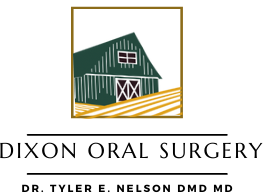Wisdom teeth, also known as third molars, usually emerge around the age of 17 or in the early twenties. The average mouth does not have enough room for an additional set of molars, which is why dentists and oral surgeons recommend having them removed early.
Oral and maxillofacial surgeons like Dr. Nelson specialize in removing these teeth. Maintaining regular checkups with your dentist will help them track the development of your wisdom teeth, and they will refer you to an oral surgeon when it is time to have them extracted. Contract Dixon Oral & Maxillofacial Surgery today to schedule a consultation with Dr. Nelson and to find out if you need your wisdom teeth removed.
Please view this Wisdom Teeth Removal video prior to your appointment
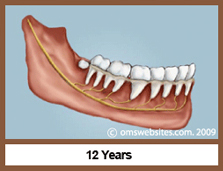
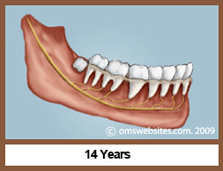

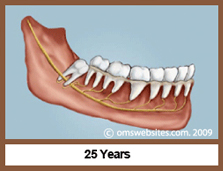
Why Remove Wisdom Teeth?
Wisdom teeth can often become impacted, or trapped beneath the gums. When this happens, the tooth grows at an angle toward the neighboring teeth. This can damage the other teeth and nearby nerves, as well as cause other teeth to shift out of place.
Canine teeth in the front of the mouth can also become impacted, but because they are crucial for a healthy bite, they are guided into place with an expose and bond procedure. Wisdom teeth, however, are not necessary for proper oral health and function and are simply removed.
When and Why Should My Wisdom Teeth Be Removed?
A tooth becomes impacted because there is a lack of space in the dental arch, causing the tooth to grow on an angle towards the other molars and their roots. This impaction can cause pain, lead to infection, or cause other pathologic conditions (See Figure 1).
The wisdom tooth may also crowd or damage the adjacent molar and its roots (See Figure 2), or damage the jaw bone and its nerves. When the wisdom tooth is growing toward adjacent teeth, it can trap plaque and debris making your teeth more vulnerable to decay.
Wisdom teeth will likely cause problems as the patient ages. We recommend that children in their mid-teen years receive an evaluation by a dentist, orthodontist, or oral and maxillofacial surgeon to determine the location and condition of wisdom teeth. Early intervention to remove wisdom teeth can prevent future discomfort, promote rapid healing, and pave the way for a healthy smile. Wisdom tooth removal also aids in orthodontic treatment by creating space in which permanent teeth can emerge or be moved into their ideal arrangement.
What Does Removing My Wisdom Teeth Require?
During your first visit, we will take detailed 3D scans of your mouth. These digital images tell us where nerves are located and the exact shape and size of your wisdom teeth. We offer many anesthesia options, although you will likely be under IV sedation. This puts you into a semi-conscious state where you are able to answer questions asked by your surgeon, but are not aware of the procedure and do not feel pain.
Dr. Nelson will extract visible wisdom teeth with forceps, similar to a standard tooth extraction. To access teeth below the gums, Dr. Nelson will make a small incision in the gum tissue. He may break large teeth into smaller pieces for easier extraction. Any incisions will be stitched closed, and you will rest in our recovery area until the anesthesia wears off. Some procedures will take longer than others depending on the number of wisdom teeth and if any are impacted.
A typical wisdom tooth extraction procedure is performed in less than 1 hour. Prior to undergoing IV sedation, you must not have anything to eat or drink for 6 hours before surgery. You must have a responsible adult present in the office during your surgery to drive you home afterward.
This person should stay with you for 24 hours to assist you while you’re under the effects of anesthesia. Our office will provide you with detailed post-operative instructions. You can use over-the-counter pain medications and ice packs to minimize pain and swelling. These instructions will explain how to rinse your mouth and brush your teeth after surgery. If you ever have questions, please contact our office.
What Does Removing My Wisdom Teeth Require?
The ease of the wisdom teeth removal depends on the position of the tooth and root development. During your consultation visit, we will take X-rays that will reveal the position of the tooth, its length, and shape. A wisdom tooth that has fully cut through the gum can be extracted much like any other tooth.
A wisdom tooth that is underneath the gums and pushed into the jawbone will require an incision into the gums and removal of the portion of bone that lies over the tooth. In this case, the tooth will be extracted in smaller portions to minimize the amount of bone that is removed.
In most cases, the removal of wisdom teeth is performed under intravenous sedation. The anesthesia options as well as the surgical risks (i.e. sensory nerve damage, sinus complications), will be discussed with you during your consultation appointment.
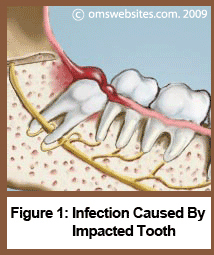
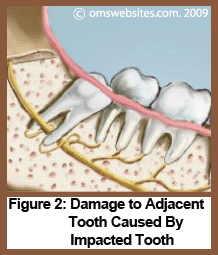
An Impacted Wisdom Tooth Can Cause:
Infections
Tumors & Cysts
Bad Breath
Dental Shifting
What Is the Cost of Wisdom Teeth Removal in Fairfield, CA, and Is It Covered By Insurance?
The exact cost of having your wisdom teeth removed varies from person to person, as everyone’s needs are different. We take several factors into the cost, including how many wisdom teeth you have, your dental insurance, your choice of anesthesia, and if you have any impacted wisdom teeth. We will provide you with a cost estimate prior to performing treatment.
Most dental insurance companies have some level of benefits for wisdom tooth extractions. To find out your coverage, contact your insurance company ahead of time.
